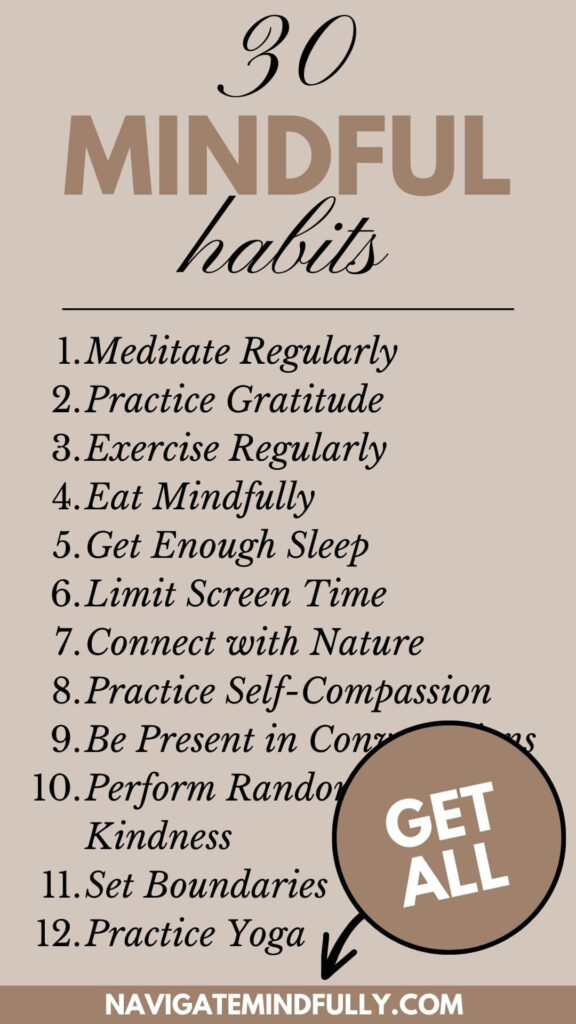30 Daily Mindful Habits for a Fulfilling Life
Have you ever felt like your days are just rushing by, with your mind constantly in a whirl? Well, mindfulness is like a gentle anchor that brings us back to the present moment, making life more enjoyable and less overwhelming. Mindfulness is a way of living. It’s about being fully present in each moment, embracing life with both arms, and finding peace in the now. In this post, we’ll explore 30 simple yet transformative habits that can infuse your daily life with mindfulness. Whether you’re new to this concept or looking to deepen your practice, these mindful habits are your stepping stones to a more peaceful and fulfilling life.
So What Exactly Is Mindfulness?
Mindfulness might seem like a complex concept, but at its core, it’s beautifully simple. It’s all about being fully present in the moment, aware of where we are and what we’re doing, without being overly reactive or overwhelmed by what’s going on around us.
Imagine you’re sipping your morning coffee. Mindfulness is about really tasting that coffee, feeling its warmth, and noticing its aroma, rather than mechanically drinking it while your mind races through your to-do list. It’s about experiencing life as it happens, rather than just letting it pass you by.
But mindfulness is more than just paying attention. It’s also about doing so without judgment. This means observing your thoughts and feelings from a distance, without labeling them as good or bad. It’s like watching clouds pass in the sky – you see them, acknowledge them, but you don’t get caught up in them.
Historically, mindfulness has its roots in ancient practices, particularly in Buddhism. However, it’s not inherently religious and can be practiced by anyone, regardless of their background or beliefs. It’s a universal tool for enhancing well-being.
Why You Should Integrate Mindful Habits Into Your Daily Life?
Firstly, mindful habits help in reducing daily stress. Life can be hectic, with a never-ending list of responsibilities and deadlines. By incorporating mindfulness into your day, you create little pockets of peace amid the chaos.
Then, there’s the aspect of improved focus and concentration. In our digital age, distractions are everywhere, making it hard to stay on task. Mindful habits train your brain to stay present and attentive, enhancing your ability to concentrate.
Mindfulness also plays a crucial role in emotional well-being. It teaches you to be in tune with your emotions, to observe them without getting swept away. This emotional awareness can lead to better self-regulation, helping you to respond to situations rather than react impulsively.
Moreover, mindful habits can improve your relationships. When you’re present and fully engaged in conversations, you listen better and connect more deeply with others. Mindfulness fosters empathy and understanding, strengthening the bonds you share with friends, family, and colleagues.
Physical health is another area where mindfulness shines. Practices like mindful eating can help you tune into your body’s hunger and fullness signals, leading to healthier eating habits. Mindful movement, such as yoga or walking, can increase body awareness and appreciation, promoting a healthier lifestyle overall.
Lastly, mindful habits can lead to a greater sense of happiness and contentment. When you live in the moment, you appreciate the little things in life more. You find joy in the ordinary, and life becomes richer and more fulfilling.

30 Mindful Habits for Daily Life
Let’s explore how simple, everyday actions can become opportunities for mindfulness. These mindful habits, easy to weave into your daily routine, are gateways to living more consciously and fully. They’re about finding moments of peace and presence amidst our busy lives.
1. Meditate Regularly
Start your day with a calming meditation session. It sets a peaceful tone for everything that follows. Just 10 minutes of focused breathing and stillness in the morning can significantly reduce stress and improve your mental clarity for the day ahead.
2. Practice Gratitude
Before bed, jot down three things you’re thankful for. Practicing gratitude is a game-changer for your mindset. This simple practice shifts your focus from what’s lacking to the abundance that already exists in your life, fostering happiness and contentment.
READ MORE: 100 AFFIRMATIONS FOR GRATITUDE
3. Breathe Mindfully
When stress starts to creep in, pause and take three deep breaths. Feel the difference? This practice helps you to center yourself, calm your nervous system, and approach situations with a clearer, more focused mind.
4. Exercise Regularly
Moving your body isn’t just about physical health; it’s a form of self-care for your mind too. Whether it’s a brisk walk, a yoga session, or a dance class, regular exercise releases endorphins, the body’s natural mood lifters.
5. Eat Mindfully
Instead of rushing through meals, savor each bite. Chew slowly, appreciate the flavors, and notice how the food makes you feel. This practice not only enhances your enjoyment of meals but also aids digestion and helps prevent overeating.
6. Get Enough Sleep
Prioritize your sleep by creating a calming bedtime routine. A well-rested body and mind are essential for overall health and well-being, and quality sleep is a foundation for productivity and happiness.
7. Limit Screen Time
Set boundaries for your digital device usage, especially before bed. This mindful habit helps you to reconnect with the real world and improves the quality of your sleep by reducing exposure to blue light.
8. Connect with Nature
Spend time outdoors, whether it’s a walk in the park, tending to a garden, or hiking in the mountains. Nature has a profound way of grounding us and helping us to gain perspective on what truly matters.
9. Practice Self-Compassion
Speak to yourself with kindness, especially during challenging times. Treat yourself with the same care and understanding as you would a dear friend. This practice is key to building resilience and maintaining mental health.
10. Be Present in Conversations
Truly listen when someone is speaking, and give them your full attention. This practice deepens your connections with others and shows that you value and respect their perspective.
11. Set Boundaries
Learn to say no and protect your time and energy. Setting clear boundaries allows you to engage in activities that align with your values and ensures that you have time for self-care and relaxation.

12. Practice Yoga
Engage in yoga to unite your mind, body, and spirit. The practice of yoga is more than just physical postures; it’s a holistic approach to well-being that includes breath control, meditation, and ethical principles.
13. Journal Regularly
Write down your thoughts and feelings as a way to process and understand them. Journaling can be a form of self-therapy, helping you to gain clarity, solve problems, and understand your emotions more deeply.
14. Unplug from Technology
Designate tech-free times or zones in your home. Disconnecting allows you to be more present with yourself and your loved ones, and it gives your mind a much-needed break from constant stimulation.
15. Engage in Creative Activities
Paint, draw, write, or play an instrument to express yourself and relax. Creative activities are a form of meditation in motion, where you can lose yourself in the flow of creation.
16. Mind Your Words
Speak with intention and avoid gossip or negative talk. Words are powerful; they can heal or harm, so choose them wisely and speak in a way that promotes positivity and understanding.
17. Cultivate Positive Relationships
Spend time with people who uplift and support you. Nourishing relationships are a cornerstone of well-being, so invest time and energy in connections that bring joy and meaning to your life.
18. Practice Forgiveness
Let go of grudges and forgive others and yourself. Forgiveness is a gift you give to yourself; it’s the act of releasing the burden of resentment and finding peace.
19. Slow Down
Avoid rushing through tasks and savor the process. Slowing down allows you to be more thorough, enjoy your activities more, and reduce stress.
20. Take Mindful Breaks
Pause for short breaks during the day to check in with yourself. These moments of pause are opportunities to breathe, stretch, and recalibrate your energy and focus.
21. Listen to Your Body
Pay attention to your body’s signals and give it what it needs, whether that’s rest, nourishment, or movement. Your body is wise; listening to it is a form of self-respect and care.
22. Declutter Regularly
Keep your living and working spaces clean and organized. A clutter-free environment promotes mental clarity and reduces stress.
23. Read Mindfully
Dedicate time to reading and fully engage with the material. Reading is a form of mental nourishment, and doing it mindfully enhances comprehension and enjoyment.
24. Savor Simple Pleasures
Enjoy a cup of tea, the warmth of sunlight, or the sound of birds chirping. These small moments are the essence of life, and savoring them enhances your sense of happiness and gratitude.
25. Practice Mindful Walking
Walk slowly and deliberately, paying attention to each step. This practice is a form of moving meditation that helps you to ground yourself and connect with the present moment.
26. Use Positive Affirmations
Repeat positive and uplifting statements to yourself. These affirmations can rewire your brain for positivity and help you to overcome self-doubt and negative thinking patterns.
TRY THESE: 100 MINDFULNESS AFFIRMATIONS TO LIVE IN THE PRESENT MOMENT
27. Seek Silence
Find time for quiet and solitude in your day. Silence is a powerful tool for reflection and rejuvenation.
28. Reflect on Your Values
Regularly consider what is most important to you and align your actions accordingly. Living in accordance with your values brings a profound sense of purpose and integrity to your life.
29. Teach Mindfulness to Others
Share the practice of mindfulness with friends, family, or community. Teaching is a powerful way to deepen your own practice and contribute positively to the lives of others.
30. Smile More Often
Make a habit of smiling, even when you’re alone. Smiling, even if you don’t feel like it, can boost your mood and make your interactions with others more pleasant.
Pin these mindful habits to have a reminder of mindfulness!

Final Thoughts on Mindful Habits
It’s important to remember that the journey towards a more mindful life is a personal and unique one. Each of these mindful habits offers an opportunity to pause, reflect, and connect with the present moment, but the most significant aspect is your willingness to engage with them wholeheartedly.
Mindfulness isn’t about perfection or achieving a constant state of zen. It’s about finding moments of clarity and calm in the midst of our often busy and chaotic lives. It’s about learning to appreciate the here and now.
Remember, the key to mindfulness is consistency and patience. It’s okay if some days are harder than others or if you find your mind wandering. What matters is your commitment to bringing yourself back to the present moment, again and again. Over time, these mindful practices can become a natural part of your daily routine, subtly transforming the way you experience the world.
RELATED POST: HOW TO CREATE A MINDFUL MORNING ROUTINE: 8 IDEAS TO START YOUR DAY MINDFULLY







